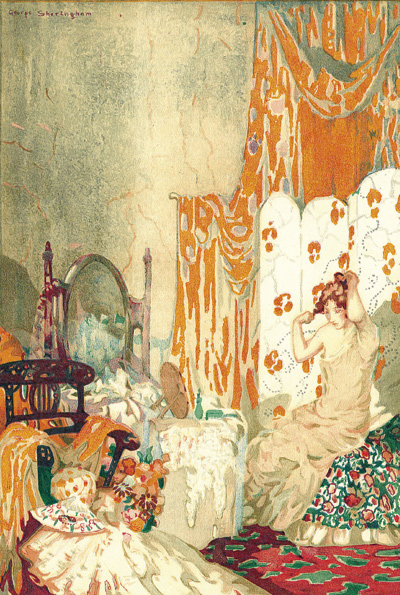Max Beerbohm, dandy, cartoonist and penetrating drama critic, was par excellence the observer of the glittering English period that stretched from the 1890s to the death of Edward VII, poking unsparing but mainly good-humoured fun at the peculiarities of its political and cultural leaders: Swinburne, Asquith, Lloyd George, Chesterton, Kipling and the King among them.
At the same time he was himself part of the scene, the master of a carefully cultivated style. His fellow critic Desmond MacCarthy once wrote of him:
I remember walking one night down Piccadilly behind that high-hat with its deep mourning band. It was then perched above a very long dark top-coat with an astrakhan collar… In a gloved hand this figure held an ebony stick with an ivory collar… I remember also noting the little black curl in the nape of his neck like a drake’s tail. His walk was slow and tranquil, such as one could hardly imagine ever breaking into a run.
The Happy Hypocrite was Max’s earliest short story, first appearing in The Yellow Book in 1896. It is a sentimental parable, a kind of lighter-hearted version of his friend Oscar Wilde’s The Picture of Dorian Gray, full of epigrammatic flourishes and passages satirising the more mawkish authors of his day.
It tells the tale of Lord George Hell, a dissipated Regency buck, ‘proud of being horrid’, who habitually cheats at cards, beggars his companions and womanises. Thanks, however, to a beneficent Cupid, his jaded eye lights on Jenny Mere, a pure young actress. Truly in love for the first time, he proposes to her. She rejects him: she can only marry a man with the face of a saint, and Lord George’s face ‘is even as a mirror long tarnished by the reflection of this world’s vanity’.
The disappointed roué solves the problem by wearing a marvellous mask, which makes him appear both spiritual and handsome. To reinforce his masquerade he gives away his ill-gotten gains and, marrying Jenny, goes with her to live on buns in a primitive cottage. His past, however, catches up with him: the dreaded vamp, Signora la Gambogi, recognises him and tears off his disguise. Abject, he begs his bride’s forgiveness for deceiving her — but, miracle of miracles, under the mask his face, through his resolute pose of unselfishness, has grown into that of a saint.
This tale can be taken as a tongue-in-cheek jeu d’esprit. Yet in its self-mocking way it carries a message in which Beer-bohm seems genuinely to have believed. ‘If you live up to a good mask long enough,’ he later observed, ‘perhaps it will become first nature to you instead of second or third.’
Who knows what oddities and vulnerabilities lay beneath his own urbane, humorous, kindly, but secretive personality? In The Happy Hypocrite he defended concealment: ‘I hold that candour is good only when it reveals good actions or good sentiments, and that when it reveals evil, itself is evil.’
Deception, at least in its more harmless varieties, was manifestly part of his nature, as shown by the endless pleasure he derived from parody and impersonation — and, into middle age, from practical jokes. He spent hours doctoring photographs of one of his pet hates — George Bernard Shaw — giving him buck teeth and a squint, then sending them, via friends, to their original model as though from an ardent admirer, saying in the accompanying letter that he had come across this interesting photograph and wasn’t it charming, would he sign it for him?
In 1918 John Lane published a new edition of the story illustrated by George Sheringham, now re-issued by Michael Walmer. The Slade-trained Sheringham (1884-1937) was a capable artist, best known as the designer for Gilbert and Sullivan productions and for London Transport posters. In The Happy Hypocrite his pastiche Yellow Book designs evoke the 1890s and, combined with the elegant Beerbohm narrative, add up to an entertaining period piece.
Its Australian publisher, a new Print on Demand house, is dedicated to rescuing works from undeserved neglect, especially classics of wit. With The Happy Hypocrite it has got off to a good start.






Comments